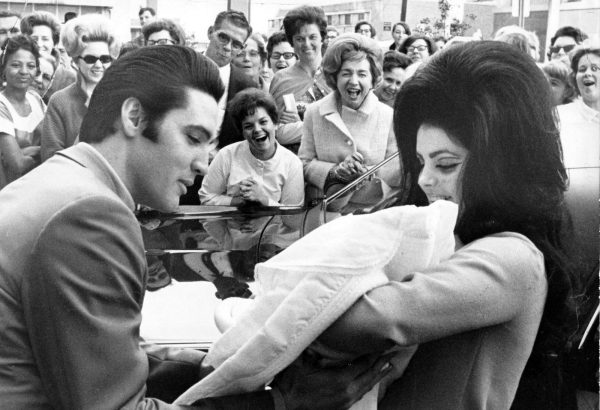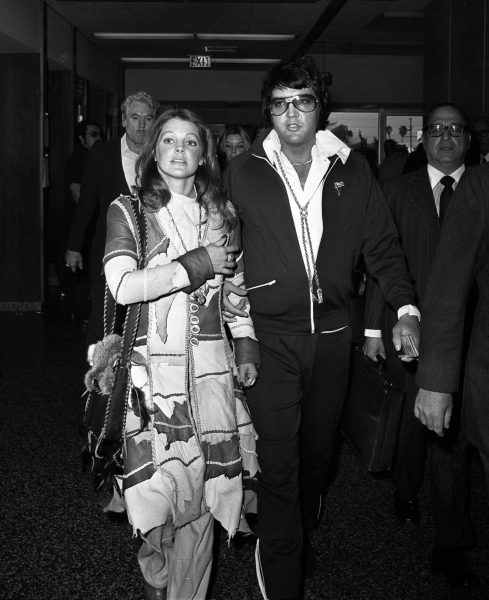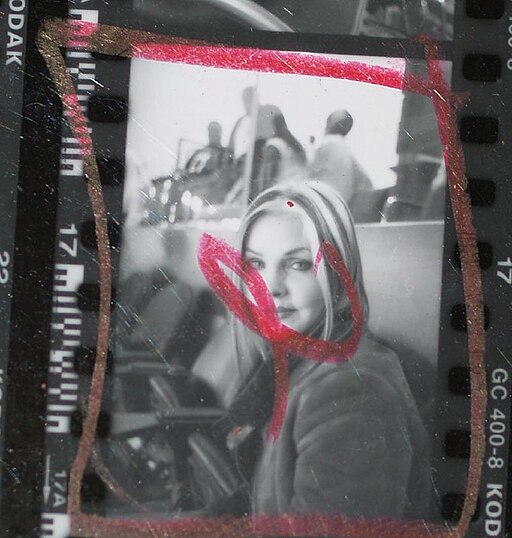The opening scene of bare feet on a plush pink rug and the application of makeup to ‘Going Home’ by Alice Coltrane immediately sets the eerie, feminine tone for Sofia Coppola’s new feature film Priscilla, a movie showcasing the life of Priscilla Presley. Coppola, most known for her movies that balance themes of fame and girlhood, carries this same essence through Priscilla, and in doing so removes the rose-colored glasses society wears when examining the lives of the Presley family and other celebrities.
Among the glitz, glamor, and flashy dramas revolving around Elvis, the life of Priscilla had always been swept to the shadows, relatively unknown to the public. However, after Baz Luhrmann’s movie Elvis that had taken the world by storm in 2022, interest in the lives of the Presleys had a resurgence. Coupled with all the buzz from Coppola’s latest work, it seems that once again the world is fixated on the entrancing lives of one of Hollywood’s most famous families.
Yet the buzz surrounding Coppola’s new film is quite different from the buzz surrounding the Presley’s before. Through showcasing the life of Priscilla Presley, the movie highlights a new side of Elvis only seen by Priscilla herself.
Starting in 1950s Germany with faded colors and minimal audio, the film immediately captures Priscilla’s dreary feelings while living on a U.S. military base in a foreign country. Cailee Spaeny, starring as Priscilla in the movie, displays a tired look on her face, emphasizing her longing for more in life.
When an unknown man approaches Priscilla inviting her to a party hosted by Elvis Presley, Priscilla, at only fourteen years old, couldn’t turn down the opportunity to meet one of the biggest stars in the world.
As Priscilla walks through the doors of Elvis’ house, sounds of laughter and music immediately fill the room, creating a shocking contrast to the slow pace of rural Germany. For Priscilla, Elvis’ life feels like a magical wonderland hidden within her world of mundane.
Once inside the house, Priscilla’s sights quickly land on Elvis, played by Jacob Elordi. Elordi, standing at 6’5” tall, towers over Cailee Spaeny, immediately introducing a clear power imbalance between the two.
What might be the most unsettling aspect of this relationship, however, is the wide age gap. Already hailed as one of the largest stars in the world, Elvis was 24 when he met the 14 year-old Prisiclla. In fact, one of his first words upon meeting her was, “Why, you’re just a baby.”
This scene immediately creates an uneasy tension in the theater, leaving viewers questioning whether their relationship was appropriate. Similar concern is shared by Priscilla’s parents after continuous requests from Priscilla to return to Elvis’ house.
However, after Elvis’ time serving in Germany, he had to leave Priscilla and return to his life in America. During this time, it was up to Elvis alone to decide whether to call or to arrange visits. Even worse, while Priscilla is waiting at home she receives countless magazines reporting of Elvis’ numerous Hollywood and celebrity relationships. From the very start, Coppola ensures that audiences understand Elvis dictates their relationship and that anything that happens is on his terms.
Eventually, after months of radio silence from him, Priscilla receives an invitation to visit Elvis at Graceland, his home in Tennessee. Soon after, he whisks her away to Las Vegas, in which there is a montage of Elvis and his friends drinking and gambling. At the end, Priscilla holds out an outstretched palm for a pill.
When she returns to Germany her hair is disheveled and her makeup smudged, the only remnant of her past youthfulness being the light blue, teacup shaped dress she is wearing. Soon after she is summoned back to Graceland to live with Elvis, permanently leaving her home and family.
In Tennessee, Priscilla’s lifestyle quickly becomes unmanageable. During the day she attends high school, and at night she stays up partying with Elvis and his friends. In order to stay awake throughout the day, she starts taking pills from Elvis.
Her appearance also changes as she attempts to conform to Elvis’ standards. As per his request, her mousy brown hair is dyed black and she begins perfecting her iconic, heavy, dark eye makeup. Her wardrobe also switches from short, girly dresses to more mature, longer dresses. Every aspect of her life, from her routine to her looks and actions, was controlled by Elvis.
Furthermore, Priscilla was constantly placed in the public eye. Prior to the birth of her daughter Lisa Marie, we watch her do her hair and makeup before leaving for the hospital, her job being to impress no matter the circumstances. When she walks out of the hospital, she was swarmed by fans and paparazzi waiting to snap pictures of her.

From all angles, Priscilla Presley seems like the perfect “Coppola Girl,” plagued with the struggles of fame, framed in an aesthetically pleasing way. Yet many critics of the movie find its faults within its portrayal of Elvis rather than Priscilla.
This question of whether Elvis’ behavior was predatory or dangerous, and the light in which Elvis was portrayed, sparked large amounts of controversy in the media. Many Elvis fans were outraged at the suggestion that Elvis was anything shy of perfect. They felt that the film was a direct attack on Elvis and was meant to smear his image.
Other fans of Elvis felt that the film was exceptionally cruel in the sense that Elvis no longer has the capabilities to defend himself seeing that he had passed in 1977. Seemingly defaming him years after his death was “uncalled for.” However, what is most remarkable about these comments is the fact that nowhere in the film does Coppola explicitly state that Elvis and Priscilla’s relationship is inappropriate. Instead she artfully avoids displaying any of her opinions throughout the movie, simply following the events described in Priscilla Presley’s 1985 memoir Elvis and Me.
While viewers have a right to critique the movie, they themselves are the ones who craft their own narratives of Elvis. With little input from Coppola, it seems to be the enraged fans themselves who are associating fault with Elvis.
Furthermore, the public fixating on Elvis’ representation throughout the film completely defeats the purpose of the movie.
As per the title, Priscilla is meant to shed light on the other half of the Presley relationship that has been long overlooked. The movie does not contain any Elvis songs, seemingly pushing Elvis out of the spotlight and stripping his character to that of Priscilla’s husband.
When the internet itself is trying to push Elvis back to the forefront of everyone’s minds, it leaves one to wonder whether or not the film truly made an impact and if times have really changed since the ‘60s.

Despite all of this controversy, the final scene of Priscilla pictures her driving out of the gates of Graceland for the final time to ‘I Will Always Love You’ by Dolly Parton.
The song choice of ‘I Will Always Love You’ in this scene mirrors Priscilla’s perspective in real life. The real Priscilla Presley has stated numerous times that she still carries Elvis in her heart while also finding this movie to be an accurate depiction of their lives.
This is clearly shown right before Priscilla leaves Graceland, when she tells Elvis that he is losing her to her own life.
Her feelings of love intermixed with her feelings of constraint largely stem from her stepping into her relationship with Elvis at far too young an age.
Spending some of the most formative years of her teenage life with no family other than Elvis, she was conditioned from an early age to think that idolizing and revolving your life around someone else is normal and right.
Priscilla’s words and view on Elvis to this day reflects the complex relationship between the two. Although their relationship forced Priscilla to become an adult rather quickly, he also shaped a large part of her.
While many viewers of the movie did find the movie to be too critical of Elvis, it is important to note that this movie is not about him, but about Priscilla.
Priscilla is a tribute to not just Priscilla Presley herself, but to every woman who has had to live for someone other than themself and believed that it was normal.
While the movie is a memoir, it reaches far past that, telling the story of women all across the world.
To watch Priscilla (rental fee required) on Amazon Prime, click HERE.
For Priscilla, Elvis’ life feels like a magical wonderland hidden within her world of mundane.

